Off Topic: The Fate of Atlantis DLC for Assassin’s Creed Odyssey starts strong with Fields of Elysium
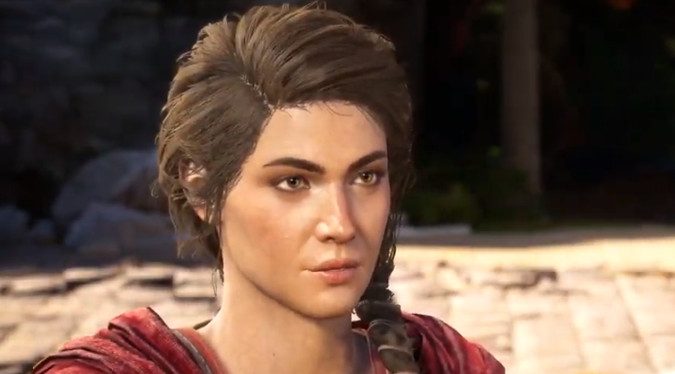
It’s no secret around here that I love Assassin’s Creed Odyssey. I’ve spent a ridiculous amount of time discussing why I think this is one of the best RPG’s out. It’s a game I’ve literally played to level 99 on my Xbox One and then went out and got for the PC thanks to a lovely gift card around my birthday. For me, that’s a huge deal, I simply don’t have the money for that level of investment. So when I tell you that the first installment of The Fate of Atlantis is a breathtaking chapter in the latest DLC for the game, I don’t do it lightly.
The first episode of that story is out now, and it does several things I didn’t expect it to be able to do. It manages to make the framing story involving Layla Hassan matter, which I would have told you was an impossibility. It ties together the events of 430 BCE and late 2018 CE in an innovative way that I will let you discover on your own. I will not be spoiling this expansion in this review — while the story isn’t a major diversion from what you expect in a game of this type, how it unfolds is part of the fun and not to be missed.
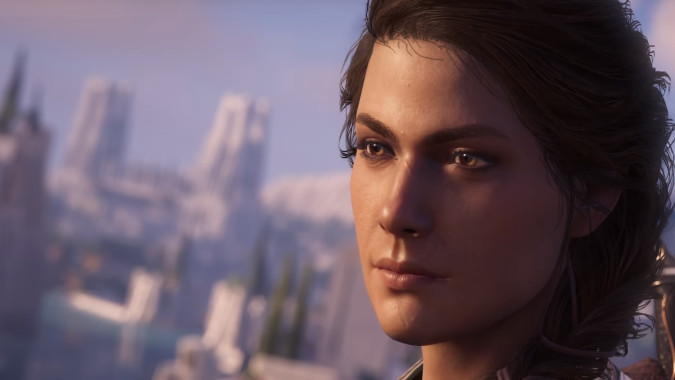
What fate, Atlantis?
The previous DLC, Legacy of the First Blade, was a solid expansion, but for many players it was very much more of the same. It didn’t really offer anything new in terms of gameplay or setting — you went to zones that already existed in game and fought enemies who didn’t really do anything you hadn’t already seen. Even the themes of family and legacy in the DLC were extensions of what we’d already seen in the main questline, emphasizing the Eagle Bearer’s desperate want for a family connection. None of this was new — and sure, it was really good but it was also more of the same. Where Legacy of the First Blade felt like it could have easily been part of the game at launch, Fate of Atlantis feels like it expands the game, that it truly is an expansion with new places to see and new ways to adventure.
The Fate of Atlantis is unfolding in three chapters, just as Legacy of the First Blade did, and this first chapter is already a big departure from the main game while staying true to the emotional roots of the story so far. Kassandra or Alexios — so Kassandra, sorry Alexios fans — must deal with the decisions made in the main story quest of the game and fully embrace the role of their unique bloodline, and in so doing, go on a journey to the Greek underworld. If you’ve read the actual Odyssey then you’ll remember the part where Odysseus descends, but ACO does it differently and it’s a wonder to behold. The first new zone, Elysium, is the realm of the honored dead in Greek myth and is ruled over by Persephone, daughter of Zeus and Demeter and somewhat reluctant wife to Hades.
It’s a magnificent, lush and completely unique place utterly unlike the Greek World we’ve seen so far, while still looking like what you might expect a Greek paradise — exaggerated rock formations, water everywhere, vivid and spectacular fields and staggering heights. You’re soon embroiled in something equally political and personal, a family squabble made all the more ridiculous because it involves gods.
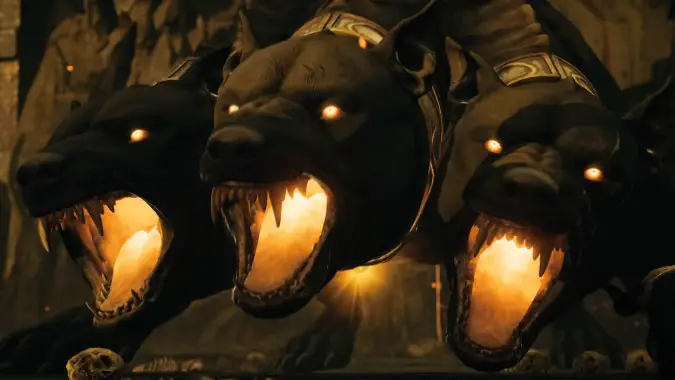
What you’ll do in Elysium
In addition to gaining new expanded versions of powers you earned before, you’ll fight new kinds of enemies with the ability to attack you in ways no previous threat has, altering how you’ll proceed in combat. The weirdest mobs I’ve fought so far are the Kolossi, something in-between a statue and an automaton that are easy to miss and which will absolutely come out to wreck your day if you start a fight with someone else too close to them. They can channel the power of the Isu (the beings the Assassin’s Creed lore credits for the existence of mythological gods in an ostensibly “real” world) to devastating effect, so be sure to be careful and take them out before engaging another threat if you possibly can.
I admit, I spent a lot of my time so far in Elysium hanging out with Hermes or Adonis (hey, can you blame me?) and just soaking in the view, but the combat has been fun and engaging and challenging because of how it makes you play your character differently. Some of the people you’re fighting are being compelled by Persephone to do her bidding, so if you can, liberating them instead of killing them can ultimately work out in your favor.
There are a variety of new ways to get around in Elysium as well — you left your boat back in Greece, but you can use special teleporters called the Wings of Hermes to get up on those tall rock peaks where much of the action is, and slide down extremely long ropes connecting higher and lower elevations. You can also ride your mount and even get a cool new one. The dialogue is fun so far, although I haven’t gotten to see what’s past part one because it’s not out yet (Fields of Elysium is longer than any of the Legacy DLC was), but it still very much feels like a starting chapter and there’s a definite sense that we’ll get more as things unfold.
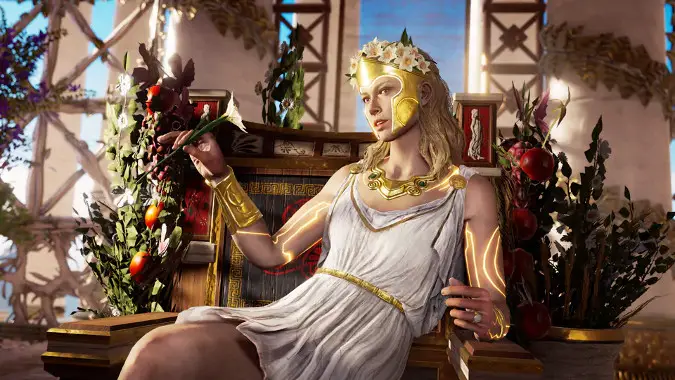
The Isu Mythos
The Isu themselves take a bigger role in Fields of Elysium than they have in a very long time, and in that way it’s reminiscent of The Curse of the Pharaohs, the similarly mythological DLC for Assassin’s Creed Origins. But so far, it’s a lot more ambitious, delving deeper into the Isu and their personalities — you get a glimpse of these self-proclaimed deities as warts and all people, and it’s fascinating even while statues are coming to life and shooting fire from the sky at you. The Assassin’s Creed setting has always had the Isu and their legacy as a cornerstone of its mythos, but for the first time we actually get a real sense of why these astonishingly powerful beings were so, well, petty at times.
I feel like in part this is due to the setting. Assassin’s Creed Origins drew from Egyptian mythology, and their gods are far less human than the Greek pantheon. The Isu we’re meeting now are the beings the Greek gods were named after and patterned on, and they display a lot of the same character flaws — impulsiveness, anger, disdain. When Adonis talks smack to Hermes and gets beat up for it, you realize you’re watching something remarkably relateable at the same time that it’s crazy and absurd.
It’s also the first time since Odyssey’s mythical creatures — the Sphinx, Minotaur, Cyclopses and the Gorgon Medusa — that we get more enemies that emphasize how strange and unearthly the Isu and their power can seem. For all that we’re told it’s science, it definitely feels a lot like Clarke’s Law is in full effect here — the Isu have technology so advanced even we modern observers could be forgiven for calling it magic.
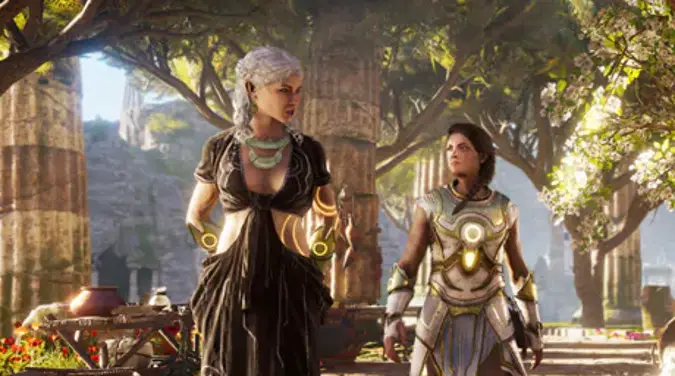
To sum it up
Get this DLC if you don’t already have it.
It’s amazing.
I’m just half-way through the first chapter and I’m not rushing because it’s just that much fun. You need this. It’s one of the best DLC any game has put out since Tiny Tina ran a weird D&D game.
Please consider supporting our Patreon!
Join the Discussion
Blizzard Watch is a safe space for all readers. By leaving comments on this site you agree to follow our commenting and community guidelines.
 @MatthewWRossi
@MatthewWRossi



